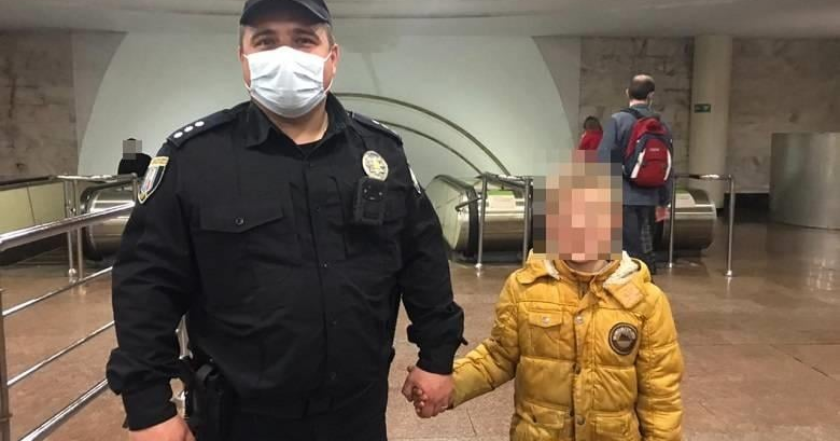Presumption of men's incapacity? Why didn’t the father in Kyiv keep an eye on his child, and why was the mother held responsible?
Gender discrimination or laziness: what the problem is, and why mothers are still held more responsible for their children than their fathers.

The other day, Kyiv police found an 8-year-old boy in the metro, wandering around the lobby of the Dorohozhychi station. The police questioned the boy and learned that he left his apartment and went to the metro to look for his mother, who had gone to do errands. The mother was found and her son was returned to her, as reported by the Kyiv police on their Facebook page.
It'd seem that the news is great. The police acted. The little Kyiv boy managed not to get into an awful story, become a victim of violence or crime, and add to the sad statistics of missing minors. But one post caused a storm of negative feedback among social media users: people were outraged because the police placed the administrative responsibility on the boy's mother, not on his father, under whose care the mother left the boy and his little sister. According to Andrii Kryshchenko, the Head of the National Police in Kyiv, the mother left the children with her father, agreeing that she would return so that the father could leave later. In the end, the father left the children alone, because the mother didn't return on time. One way or another, but the boy went to look for his mother himself.
"Juvenile police conducted a preventive conversation with the boy's mother and warned her to be careful and watch the children," the Kyiv police said in a statement. "An administrative report was opened against her under Part 1 of Art. 184 of the Code of Ukraine on Administrative Offenses. In addition, the mother sincerely thanked the police for finding her son and assured them that in the future, she will pay more attention to children's education."
Mother is always to blame
Naturally, people had logical questions: why was the mother punished, and not the father, who didn't keep an eye on his child? What's the point of preventive conversation with the mother? Was she advised never to leave her children with her father again? Does she always need to take children with her when going on business? What exactly is her fault? And why is the child's father, an adult man, so demeaningly perceived as "some hamster or parrot in the house, just part of the interior," who doesn't bear any responsibility?
Unfortunately, the situation when the responsibility for the child rests solely with the mother isn't isolated. According to a study by the DEJURE Foundation, out of 628 court decisions, almost 80% of administrative protocols were initiated for the mother and only 17% for the father. In 3% of cases, for grandparents or other guardians. As a result, 15,870 women were prosecuted, 60.72% more than men.
"Such a glaring difference in attitudes towards women and men raising children," said Iryna Shyba, executive director of the DEJURE Foundation, "may indicate gender discrimination by both police officers who draw up administrative protocols and judges who call to account. After all, when considering the case, the latter practically don't ask the question of who's raising the child and why only one of the parents is brought to justice. Ukrainian society continues to live in the prejudice that raising children is a woman's business."
It's difficult not to notice that in Ukraine, there's a "presumption of men's incapability" in family matters. It's especially noticeable when children attend kindergarten or school; all the responsibility for the upbringing and development of children falls on the shoulders of women. Preparation for children's activities, behavior, problems with learning, teachers appeal to mothers almost always on all issues. And moms? Moms have time for everything: to participate in parent meetings and children's holidays, teach poetry and check homework, take children to sports sections and the doctor's office, watch cartoons with them in the cinema, and buy new things in stores. In addition, they have a social life, work, run a household, and take care of all family members.
And sometimes, rush headlong to the police station to pick up a child who managed to slip out of his father's nose, and even get punished for it.
According to a psychologist, psychodiagnostic specialist Kateryna Khomenko, the situation in the metro, when the police not only created a situation of pressure and accusations against the mother but also actually assessed it as the norm that the father isn't able to bring up the child, reflects the general socially contradictory attitude to rights and the functions of modern women and mothers.
Overworked motherhood. Why so?
"The first aspect of this phenomenon is society's excessive demands on mothers, even from their families.
Modern society and the state have fewer and fewer educational functions. Amid the 'Fourth Industrial Revolution,' the transformation of the labor market, the systematization of public education, they're increasingly being assigned to the family, or rather, to its most active members.
The second aspect is the functionality of the couple.
Raising children comprises resources (strength, time, finances), as well as the extent to which the couple has mutual understanding, respect for the needs, tastes, interests, capabilities of each other, and harmonious, flexible distribution of responsibilities and affairs. If the mother cannot agree with the partner (the father of the children), or find resources outside, she's harnessed to 200% of the parental support alone. Logically, a woman isn't always able to pull out the situation herself and begins to 'fail.' The reasons may be exhaustion, impaired productivity, aggravation of diseases, emotional disorders, even suicide. Take into account the fact that now the load and stress are increasing due to numerous economic crises, lockdowns, the threat of infection with the virus. As a result, the child loses both parents due to the lack of a sufficiently active father.
There's a postulate in child psychotherapy: if the mother creates space for the child and withstands the associated load, she can do so productively only when the father or another person provides the mother's needs. If it doesn't happen, with the requirement to be on all fronts, the female psyche will be torn to pieces. Okay, she (the woman) will pull. But at the cost of health and longevity.
The third aspect is the issue of strength, aggression, and satisfaction of needs at the expense of those who cannot give adequate resistance.
A simple example. A woman with a child tries to get a discounted seat on a minibus, but a chubby, confident driver refuses. A child is in the mother's arms, in winter, a woman is forced to pay full price or leave. Or she has the spirit, time, and energy to defend her rights, call the police, and cite articles of the law, endure conflict, and still resolve issues in the midst of the crowd and the nervous situation with a child in her arms. Imagine the same situation when a woman is replaced by a dad. The driver is likely to retreat and give a discount. A common issue of strength. If a woman doesn't have equal or greater power, she will be forced to agree."
"We can think of different reasons why the woman signed the administrative protocol without being guilty," Kateryna Khomenko continues. "We can explain it as something usual, or based on our own experience. But statistics have no emotions: among those who can resist and aggressive reactions, there are 2/3 of men. 2/3 men against 1/3 women! The police wanted to finish the case as soon as possible, the woman was in a situation of stress, and it was easier to put pressure on the stressed person. So what's the society's level where everything is really decided by the laws of the jungle?"
What do the police say?
At the request of the public and journalists, Natalia Kernytska, a Kyiv police public relations representative, explained: "Since the mother came to pick up the kid, the protocol was drawn up against her. We can't hold a child and wait for a father. So we talked to the mother. There's an article, 'failure of parents to fulfill their responsibilities.' Nobody points the finger at mom. Two parents are responsible for their children. We could've waited for Dad until the evening, but Mom came, so we talked to her."
From the explanation of the police, it becomes clear. The father would've come, the report would've been drawn up for him, but the mother was the first to catch their eye. She cleaned out the mess and sustained the punishment from the police as a family representative for a careless husband. And then they let the family figure out on its own which of its members is more guilty, and who's to blame. Well, the "family court" is often quite effective, but should law enforcement officials count on such measures?
Usual case or exception?
"The responsibility for raising children rests with both parents," Maksym Zubashkov, a human rights activist and assistant lawyer at Perfecto JSC comments. "Yes, the Law of Ukraine 'On Child Protection' in Part 1 of Art. 12 indicates the same degree of responsibility of each parent for the upbringing, education and development of the child, and so on. Article 141 of the FC of Ukraine declares that the mother and father have equal rights and responsibilities towards the child and whether being married doesn't 'play a role.'
Fulfilling these responsibilities is quite strictly regulated by the current legislation, in particular in the consequences of parents not fulfilling their responsibilities to their children, and it's, of course, very correct. The level of responsibility varies from civil law (Articles 1178, 1179 of the Civil Code of Ukraine) to administrative (Article 184 of the Code of Administrative Offenses) and even criminal (Article 166 of the Criminal Code of Ukraine). Of course, we shouldn't forget about other types of parental responsibility, which seem to be 'aside,' in particular, the deprivation of parental rights under Art. 164 of the Family Code of Ukraine.
However, the law doesn't fulfill itself, it's implemented by people, usually endowed with clear state powers, including units of the National Police. Of course, in this situation, the very fact that the police promptly responded to a child walking unaccompanied by an adult at a metro station is positive. However, in no way overestimating this fact, serious questions arise precisely regarding the protocol on an administrative offense against the boy's mother under Part 1 of Art. 184 of the Code of Administrative Offenses, the disposition of which reads as follows: 'evasion of the parents or persons replacing them from fulfilling the obligations provided by law to ensure the necessary living conditions, education, and upbringing of minor children to the boy's mother.' As can be seen from the press release of the Kyiv Police, the mother didn't leave the child in danger and didn't show negligence in raising the child, but on the contrary, left him with his father and younger daughter at home. Regarding the issue of drawing up a protocol in general, I'd note here that it's by Part 1 and Part 2 of Art. 254 of the Code of Ukraine on Administrative Offenses, it's necessary to draw up the protocol on the person who has committed an offense, or within 24 hours from the moment of detection of such person. Based on the factual circumstances of the case, it'd be more appropriate to draw up a report on the child's father, because he "overlooked" the kid, than committed the administrative offense."
Will the boy's mother be prosecuted?
According to Maksym Zubashkov, most likely, the court will refuse to bring the boy's mother to justice, because so many such cases, when the protocol is drawn up wrongly, don't indicate specific violations of parental responsibilities arising from the FC of Ukraine, the Central Committee of Ukraine, etc. (since Article 184 of the Code of Administrative Offenses is a blanket norm that refers to other regulatory legal acts).
"In fact, such a situation is very common not only in commented legal relations," the lawyer adds, "A large number of 'odious' case laws exists. For instance, preparing protocols on administrative offenses under the current Article 443 of the Code of Administrative Offenses 'Violation of quarantine rules.' An incredible number of them were compiled, but due to violations in their compilation, both in the material and procedural aspects, individuals were hardly prosecuted. So what is it, why is it happening? Is it the incompetence of the National Police, or just laziness? I'm convinced that both. Why look for a father, go somewhere and make a report on him, if the mother is here, next door, and she also has the appropriate responsibilities for the child? That is why I'm convinced that in the current situation, there are no gender stereotypes, and the problem is systemic, both mental and qualification-related, and it needs a systemic solution.
Gender discrimination or laziness?
However, feminist communities still see the gender component in the metro's case. Moreover, as the discussion participants rightly note, this situation is indicative and offensive for both parties.
"Mothers are annoyed," Khrystyna Morozova writes, "that all the responsibility for raising children falls on their shoulders. Even if it's not the case in their specific marriage or partnership, state institutions constantly point this out. And the National Police is a state institution. According to the logic of the state, the mother has no right to leave the house until the child reaches the age of majority, and an administrative protocol may arrive even for a long stay in the toilet.
But this situation is even more offensive to dads. The state, represented by the National Police, simply doesn't recognize their subjectivity in raising a child. Papa-vase, papa-stool, the things they wrote in the comments to the report! And it's true, sad, and unfair. Almost all the feminist communities I follow are outraged."
Hanna Dovhopol, Gender Democracy Program Coordinator, Böll Foundation, Kyiv-Ukraine Bureau Gender Expert, invited the men to take the opportunity to respond publicly: "You can make a demonstration under the police building, as feminists do. After all, it's not just a shift of responsibility to women, but a discursive recognition of a man as incapable of caring for children. And that should offend men, right?"
Ukraine's fathers may listen to this proposal, and finally, not only will they loudly declare their rights, but will also enjoy them to the full. And the police and society will stop seeing the mother as the only responsible person and consider fathers as full-fledged parents as well.
























































